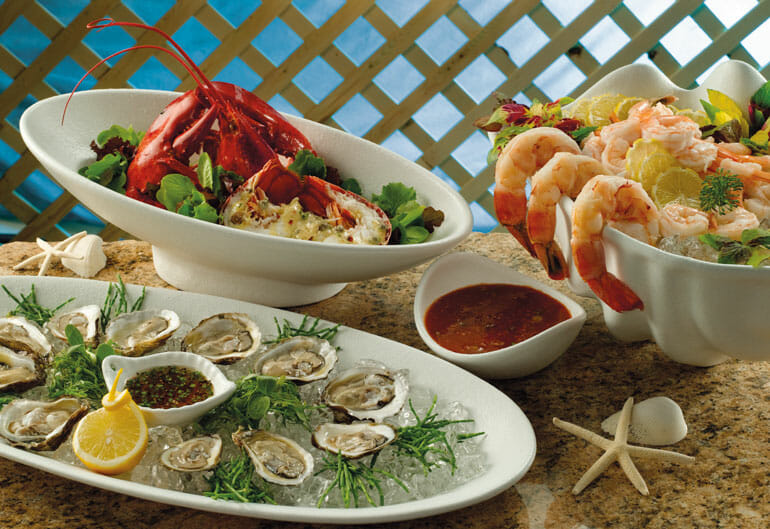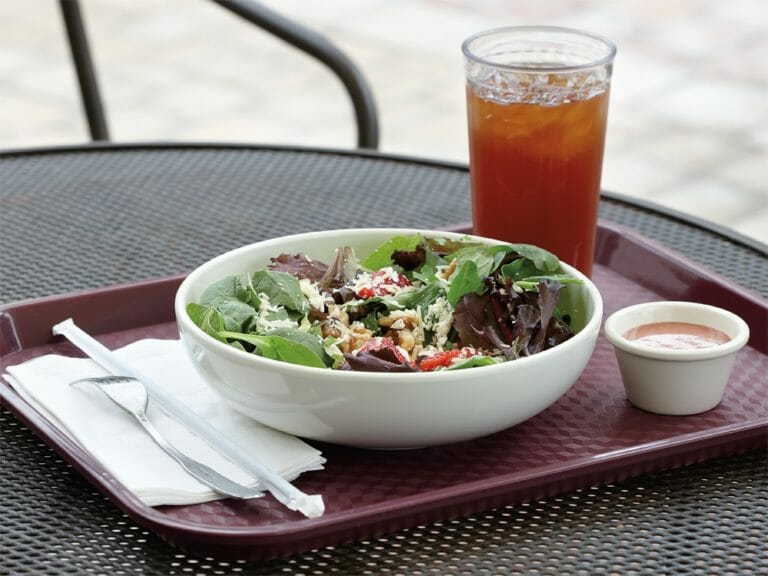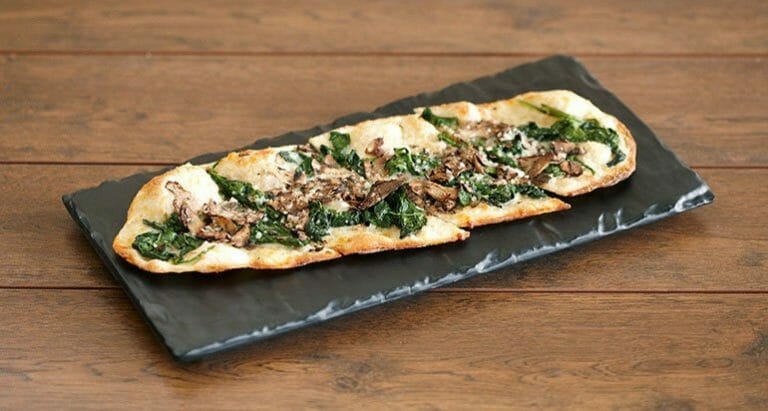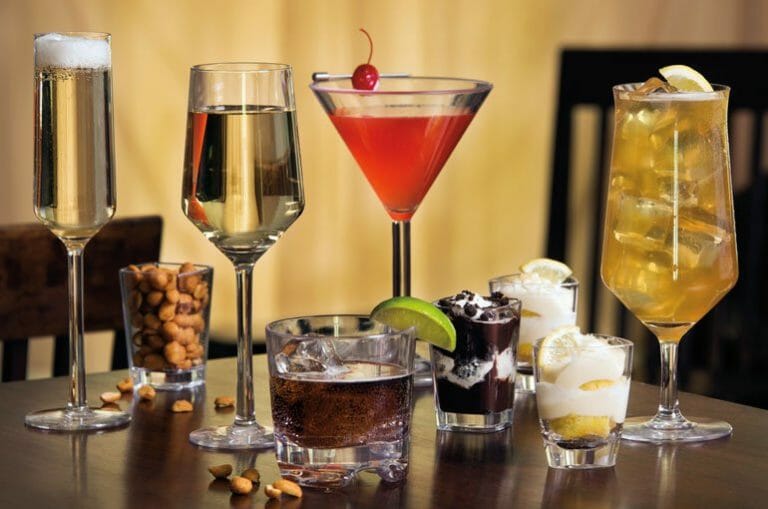Resin-Coated Aluminum: Care and Maintenance
You’ve smartly decided to invest in resin-coated aluminum serve ware and cold bar systems for your foodservice operation. Now when your guests look at your cold bar, they’re greeted with clean lines, sophistication, and bold vessels drawing them into their dining experience. Your old stainless setup could never attract the crowd you’re winning with resin-coated aluminum, especially if you’re using G.E.T.’s Bugambilia¨ collections, Classic and Fit Perfectª.
To keep your pieces looking out-of-the-box new, you’ll want to follow some basic care and maintenance. Here at G.E.T., we’re huge fans of our customers getting the very best out of their investments, so we’ve assembled a resin-coated aluminum care and maintenance guide just for you.
What’s So Special About Resin-Coated Aluminum Anyway?
Resin-coated aluminum food pans, crocks, and specialty vessels hold food on cold buffet bars. They work in tandem on cold bars either using ice, risers, tiles, or spacer bars to hold the vessels in place.
Designed for use with cold applications, resin-coated aluminum gets to desired temperatures faster, and holds them longer than stainless steel traditionally used on cold bars, which is one of its most favored benefits.
Bugambilia¨, G.E.T.’s collection of resin-coated aluminum ware, is also available in 23 colors and two finishes: Classic (playful, rough finish), and Mod (sleek, smooth finish). Operators can pick from the existing colors, or customize their own to tie in their cold bar presentation with their overall branded style.
Regardless of the color, finish, or the method you choose to support your vessels (ice, risers, tiles, spacer bars), resin-coated aluminum products outshine any standard presentation you’re likely to run across.

Keep Your Resin-Coated Aluminum Beautiful with Basic Care and Maintenance
Like any dinner or drink ware in a commercial foodservice operation, basic care and maintenance are important for getting the best service life, keeping your pieces clean and sanitized, and preventing premature chipping, cracking, fading, etc. More importantly, not following good care and maintenance can cost you money because you’ll have to replace your serve ware more often than you otherwise would.
Let’s take a look at care and maintenance best practices for resin-coated aluminum. You can use this as a guide to create your own care and maintenance program, or to benchmark an existing one.
Resin-Coated Aluminum is Excellent Display Ware … So Don’t Store Food in It
Resin-coated aluminum vessels sport a unique look that makes any menu item look like a million bucks. But we recommend confining your use of these pieces to displaying food for guests during service. We’ve heard from some operators asking whether they can store food in their resin-coated aluminum food pans or crocks. This is not recommended for a few reasons:
- Food can stain the resin coating if left for too long, especially with colorfast foods like beets and dressings
- Resin-coated aluminum is designed for display use, not for food storage (no food-safe lids, staining)
- Resin-coated aluminum should be washed after each service for general sanitation/cleanliness
You can use metal serving utensils with these pieces, just avoid carving and serrated knives because they’ll scratch your coating.
It may go without saying, but we also recommend not using your resin-coated aluminum display ware for cooking, baking, or as a food prep tool. Just stick to displaying your delicious fare during service and you’ll be good to go.

Mind the Temperature Range that Resin-Coated Aluminum is Exposed To
Like we mentioned, the primary and intended use for resin-coated aluminum is cold applications, but some folks like to use it for hot. You can use it for hot applications as long as the temperature consistently stays at or under 200°F. If you choose to use it in this way, just know that hot applications have about a third of the service life that cold does.
This is because any type of heat above 200°F on these products can cause the resin coating to break down, melt, lift, or separate from the aluminum over time, leaving you with a piece that should be retired from service.
G.E.T.’s Bugambilia¨ uses a proprietary process to apply the resin coating to the aluminum, creating a bond that other retailers can’t match. In fact, most distributors of similar products have re-coating programs because their coating will peel after some time. Bugambilia¨ doesn’t have such a program. Because of their unique process of applying resin to the aluminum, it’s simply not needed under normal use and with proper care and maintenance.

Generally, you’ll want to keep the temperature range between -20°F and 200°F. Under normal use, there should not be much opportunity to get beyond that temperature range anyway, even if we’re talking about the dishwasher. Commercial dishwashers typically don’t get hotter than 180°F.
The -20°F to 200°F temp range also means that resin-coated aluminum should be kept out of the oven. We don’t recommend using resin-coated aluminum on steam wells because they don’t hold heat at a consistent temperature, meaning they can get hotter than 200°F. Additionally, dry heat breaks down the coating faster than steam. Sometimes steam can escape from these wells, leaving you with a dry well that may also be over the recommended temperature range.
And it probably goes without saying, but because these pieces have a metal core, they’re not microwave-safe.
We do, however, recommend storing clean, empty resin-coated aluminum vessels in the walk-in cooler. This allows them to reach cold temperatures effectively. Doing so means that your vessels are ready for service whenever you need them, including keeping back-ups on-hand should you need to refresh one during service.
G.E.T. Warranties Resin-Coated Aluminum Longer for Cold Applications than for Hot
G.E.T. warranties Bugambilia¨ for 3 years if using with cold applications and 1 year for hot. Essentially, this is in response to the known shorter service life when resin-coated aluminum is used for hot applications. We’re able to provide a 1 year warranty for hot applications, however, because of the unrivaled bonding between the resin and the aluminum via a proprietary process.
If you notice any peeling, separating, etc., showing up on your Bugambilia¨, we recommend retiring it. This is because aluminum is naturally susceptible to corrosion, which you’ll agree isn’t on anyone’s menu. It’s possible for water to get stuck in a small area between the coating and the metal, causing bacteria to develop â also not on the menu. Allowing your pieces to retire with dignity just helps to keep your presentations looking great and your guests coming back for more.
Again, none of these issues should present themselves under normal use and with proper care and maintenance during the warranty period.

Avoid Dropping, Striking, or Banging Resin-Coated Aluminum Against Hard Surfaces
Bustling foodservice environments offer no shortage of temptation to move fast and consolidate as much as possible for efficiency’s sake. This often translates into overstuffed bus tubs and service trays, pieces getting bumped around, etc. However, aluminum is softer than stainless steel and other common foodservice metals, which is why we recommend treating it gently.
We’re not talking about pulling out white gloves, but we are talking about avoiding:
- Striking your pieces against a trash can or other hard surface to remove leftover food
- Use a spatula or spoon instead
- Dropping on hard surfaces like the floor of a kitchen or walk-in cooler
- Placing in bus tubs alongside other loose pieces that can bang around on the way back to the kitchen
If you take reasonable steps to prevent your Bugambilia¨ from getting knocked around, you’ll be rewarded with great-looking pieces for years.
Pre-Soak Resin-Coated Aluminum Twice Monthly
To keep your coating in excellent shape, pre-soak it twice a month in warm water with granulated detergent. You’ll want to soak it for at least 4 hours to get the full benefit. We’ve heard from some operators saying they don’t have 4 hours to spare during a normal day. That’s easily remedied by substituting for an overnight soak instead. The 4-hour mark is the minimum amount of time to get the best result. Pick a couple days each month, like the 1st and the 15th, and have your closing shift place the vessels in a pre-soak before they head out.
Pre-soaking helps to reduce the chance of your coating getting stained. It may also help to remove a stain if, like most stains require, it’s quickly addressed. Protein buildup, which happens with nearly all foodservice ware, can be reduced and avoided with this practice as well, which will keep your coating from dulling.

Wash Resin-Coated Aluminum in Your Commercial Dishwasher
It’s safe to wash resin-coated aluminum products in commercial dishwashers, regardless if yours is a high or low heat version. Earlier, we mentioned that you shouldn’t get your vessels hotter than 200°F. We’ll reiterate here that it’s perfectly fine to use a high heat dishwasher because the temperature shouldn’t reach more than 180°F.
Generally, rinsing away leftover food residue followed by a quick scrub with a sponge or white scour pad for stubborn residue is a good idea before your vessels go in the dishwasher. It makes the dish cycle that much more effective and is another step you can take to reduce protein buildup. Green scour pads and steel wool are too abrasive and will scratch your beautiful coating.
Once you’ve rinsed and scrubbed, go ahead and load your resin-coated aluminum onto a dish rack. Be sure not to overload your dish racks. If you do, your pieces won’t be thoroughly cleaned because the water will be blocked from reaching 100% of the product. Additionally, do not use iodine-based sanitizers because it may cause your coating to discolor and/or dull.
Quick-View Check List
Do’s:
- Keep between -20°F and 200°F
- Avoid dropping, striking, and banging
- If you notice wear or tear on your coating, retire that piece from service
- Presoak twice monthly
- Rinse and scrub with a white scour pad before washing
- Wash in any commercial dishwasher
Don’ts:
- Expose to flame or dry heat above 200°F
- Use for food prep, cooking, baking, or food storage
- Put in the microwave
- Use carving or serrated knives
- Scrub with green scour pads or steel wool
- Use light colored coating for vessels intended to hold colorfast food due to the possibility of staining
- Use iodine-based sanitizers
These practices should serve you, your guests, and your investment well as you enjoy the high-end look resin-coated aluminum products create. Like we mentioned, please feel free to use this information to develop your care and maintenance program, or to check it against an existing one. If you’re interested in more information on different Bugambilia¨ cold well systems, we recommend reading âBugambilia¨ Cold Bar Systems for Foodservice: Tiles vs. Fit Perfectª.â
{{cta(‘8d97949d-5da3-4d20-be7d-c81134328a61’)}}









